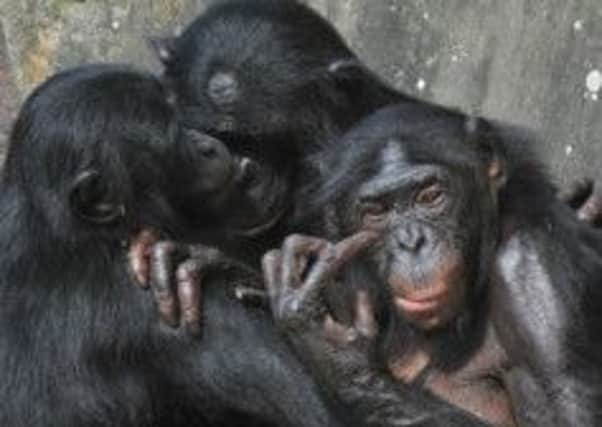Book review: The Bonobo And The Atheist, Frans de Waal


The Bonobo And The Atheist
Frans de Waal
Norton, £18.99
Reading it, they thrill to the story of human astronauts marooned on a planet run entirely by the higher apes. There the roles of men and monkeys have been reversed. Men are put in cages in zoos, experimented on and hunted for sport. Filmed as Planet Of The Apes, Boulle’s wry French satire became a thumping American morality tale with a philosophical and anthropological puzzle at its heart: treated like animals, would man become an animal? Gifted the human agency of speech, would ape become human?
The moral parallels between mankind and their poor forked hairy cousins long predate Darwin: the cavorting monkeys drawn in the margins of medieval manuscripts by transcribing monks offered a Rabelaisian commentary on the improving moral texts. Chimpanzees, with their elaborate kisses, cuddles and dependent babies latched on to breasts look so clearly like hairy cousins of ours that it is hard to fully understand the 19th century debates between Bishops and Darwinists on evolution. Did nobody look in the mirror?
Advertisement
Hide AdPrimatologist Frans De Waal’s book comes at this debate from a different angle: do chimpanzees and bonobos behave ethically? If they do, does their behaviour give the lie to the argument that human morality is imposed by higher brain functioning and inherited religion? Could ethical behaviour, far from being a result of our enculturation, actually be hardwired, serving an evolutionary purpose?
If so, the results could put morality back into the evolution debate, which has been taken over by noisy atheists like Richard Dawkins, who portray evolution as a by-product of billions of “selfish” genetic decisions.
De Waal argues that we have mischaracterised evolutionary struggle as a straightforward “blood and guts” battle for supremacy. From watching his chimps, De Waal sees apes comforting each other, soothing emotions, consoling those who have lost out in skirmishes for food or dominance. He also movingly describes the efforts of a chimp troupe to comfort one of their number who was dying of cancer. One female chimp pushed matting straw behind the back of the dying chimp in the way that a nurse might plump up the cushions of a patient in hospital.
The bonobo monkeys of the title are relevant here because their behaviour, with its apparent flouting of the conventions of how we think evolution happens, has long challenged evolutionists. Bonobos literally would rather make love than war. Polymorphously sexual, they mate in every imaginable combination, defuse tensions within the group with a spot of genital to genital rubbing and when they encounter a rival troupe are more likely to have sex with them than bite them. These frisky little primates have long surprised scientists (and have been dragged into the debate about whether homosexuality is “unnatural” or is in fact part of the great diversity of animal sexual behaviour.)
Now De Waal argues that the bonobos’ social play serves an ethical purpose in moderating the behaviour of the group and might even represent a “bottom-up morality.” Ethical behaviour could be encoded deep within the animal, and human brain.
But if De Waal’s argument is elegant, the prose is not always so. Long looping paragraphs seem to tootle around the point but don’t actually reach it. We hear a lot about De Waal’s encounters with the Dalai Lama, and a huge amount about all his previous books. Some sentences cry out for the attention of an editor. Christopher Hitchens is described flatly as “the late British writer of God Is Not Great”. A sensitive bonobo with a red pen could have improved proceedings hugely. «